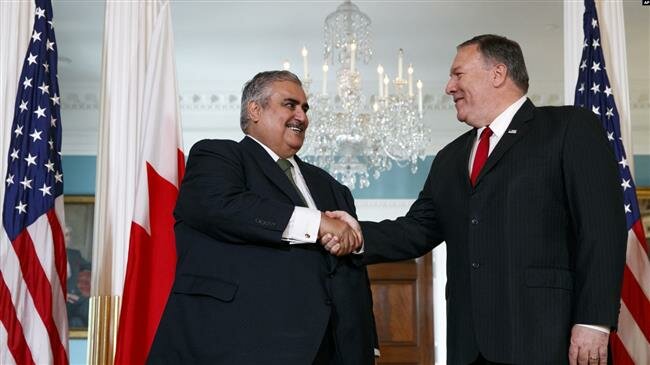TEHRAN, Jul 18 - The Bahraini regime plans to host an international conference led by the US with a focus on what the tiny kingdom and its allies call “Iranian threats” to the security of navigation in the Persian Gulf, months after Washington hosted a similar belligerent forum against the Islamic Republic in Warsaw, Poland.
 TEHRAN, Young Journalists Club (YJC) - Foreign Minister Sheikh Khalid bin Ahmed Al Khalifa of Bahrain announced the upcoming conference alongside the US special representative for Iran, Brian Hook, at the Atlantic Council in Washington on Wednesday.
TEHRAN, Young Journalists Club (YJC) - Foreign Minister Sheikh Khalid bin Ahmed Al Khalifa of Bahrain announced the upcoming conference alongside the US special representative for Iran, Brian Hook, at the Atlantic Council in Washington on Wednesday.
“The conference will aim to reach a common understanding on addressing the challenge posed by Iran,” said the Bahraini minister.
The comments come after Washington said last week it was seeking partners for a military coalition to “safeguard” the strategic waters off Iran and Yemen.
Several oil tankers were targeted near the Persian Gulf last month, with Washington and its ally Saudi Arabia quickly blaming Iran for the suspicious attacks.
Tehran has rejected the accusations of its involvement as baseless, saying the incidents in the Sea of Oman appear to be false flags meant to frame the Islamic Republic.
The Persian Gulf region has been rife with tensions since late April, when the United States began a push to drive Iranian oil exports to “zero” as part of the sanctions Washington re-imposed on the Islamic Republic after abruptly abandoning a 2015 multinational nuclear accord.
In early May, the US started beefing up its military presence in the Persian Gulf region, sending military reinforcements, including a strike group, and troops to the Middle East.
Tehran-Washington hit a new high after the US military sent a surveillance drone on a spying mission into Iranian airspace, prompting a response from the country’s air defenses.
During their talks on Wednesday, Hook and bin Ahmad said the anti-Iran conference would likely be held in late October and would follow up the February hostile meeting co-hosted by the US and Poland in Warsaw against the Islamic Republic.
Hook said the Bahrain conference is expected to draw officials from the 60-plus nations that participated in the Warsaw summit, “but the invitations have not been sent out yet.”
The two officials said the Warsaw summit had paved the way for a deepening unity between Arab powers and Israel against Iran.
“I’ll say one nice thing about Iran’s foreign policy,” said Hook. “It has brought Arabs and Israelis together in ways that we [hadn’t] thought possible.”
Israeli Prime Minister Benjamin Netanyahu had overtly described the so-called Middle East Security confab in Warsaw as “an open meeting with representatives of leading Arab countries, that are sitting down together with Israel in order to advance the common interest of war with Iran,” in comments that even shocked the US itself.
That forum — which Tehran called a “desperate circus” — was met with a cold shoulder from Washington’s allies in Europe.
During the talks with Hook, the Bahraini minster said the Warsaw conference showed clarity in our views regarding many matters in the region, especially when we came to talk about the threat from [Iran] … and we didn’t want to lose the momentum.”
He described the upcoming meeting as “fitting” since Bahrain is home to US Naval Forces Central Command and the US Navy’s Fifth Fleet.
While advocacy groups, including Human Rights Watch criticize Bahrain for harassment of activists and journalists since nationwide anti-government protests there in 2011, the tiny Persian Gulf state has emerged as a key player in the White House’s wider Middle East strategy.
Last month, Bahrain hosted a US-led conference in support of President Donald Trump’s controversial proposal for “peace” between the Israeli regime and Palestinians.
The US-led meeting which sought to discuss what the United States had described as the economic part of Trump’s “deal of the century” was boycotted by the Palestinian leadership.
The Bahraini foreign minister also held talks with his US counterpart Mike Pompeo and “discussed heightened tensions in the region and the need for stronger maritime security in order to promote freedom of navigation”.
In addition, bin Ahmad sat down with US National Security Advisor John Bolton, who praised Manama for hosting the recent US-led conference on proposals for Palestine’s economy.
Source: Presstv
Tags
Your Comment